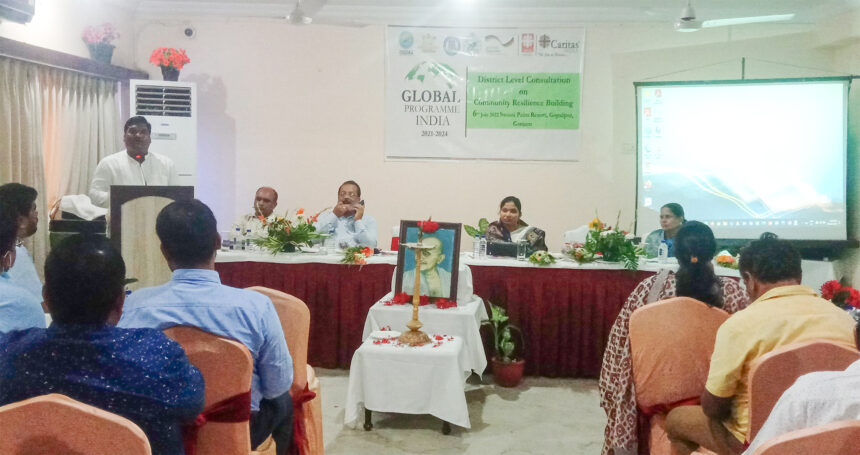Representatives from government departments, Civil Society organisations and Panchayati Raj Institution members meet at Ganjam, Odisha to improve the coordination mechanism and develop resilient systems and processes to address disasters effectively.
Caritas India has organized the stakeholder’s consultation on disaster resilience in the Ganjam district on 6th July 2022. The event was organised in collaboration with the district administration and SWAD -Berhampur as part of a joint initiative the strengthening dialogue and build relationships with government and local administration at the state level in Odisha. Around 40 delegates from government offices, Panchayati Raj Institutions and Civil Society Organisations participated.
Participating as a chief guest of the consultation, Ms. Priya Rannjan Prusti, Additional District Magistrate of Ganjam district, talked about zero casualties in the disasters, disaster response measures, revision of disaster management plans, and WASH initiatives undertaken in the district during a disaster situation. The future course of action of the district is to promote GPDP and BDP (block-level development plans) in consultation with People with Disabilities (PwDs) and women, she added. She also talked about the importance of having data base of village-level disaster management plans for a successful response program.
Mr. Abani Chandra, District Program Officer of OSDMA presented the recently revised District Disaster Management Plan (DDMP) for the year 2022-23. He shared the Hazard, Risk and Vulnerability Analysis, Institutional arrangements, Capacity building, Prevention and Mitigation measures included in the plan. He also highlighted the two newly added provisions of Climate change adaptation measures and Forest fire management in the revised DDMP.
Chief District Agriculture Officer, talked about protecting the on-farm livelihoods of the people to better respond to the disasters. He shared about the necessary steps being taken in the district for the same and committed to the resolution of issues faced by the agricultural communities due to long-standing flood water.
The Superintendent Engineer of RWSS shared about drinking water facilities in the district and the physical measures being undertaken to make the structures resilient to disasters. The district has got 28000 tube wells, 1600 drinking water supply schemes and 500 solar drinking water schemes have been running at present, he added. The Chief District Medical Officer shared about the year-round availability of essential medicines in all the health centres in flood-prone areas.
The district Horticulture Officer suggested collaborating with Caritas India and SWAD -B for their human resources for their program of promoting vegetable gardens in Households.
Recommendations shared by PRI members and CSOs:
- Mock drill should be done on different dates to cover more villages and habitations
- Shelter committee not functioning well, and a new shelter committee should be formed. The meeting of the shelter committee should be convened every month for the smooth running of the shelters
- Lack of manpower poses difficulties and delays in doing rehabilitation activities and therefore, the vacancy post of Panchayat Executive Officer should be filled in as early as possible.
- Drinking water facilities should be arranged in seashore areas.
Way Forward:
- VDMP and GPDP will be carried out in the entire district of Ganjam.
- The flood resilient verities of paddy seeds will be introduced and linked to the Khalikote area where 5000 acres of paddy got damaged every year.
- District Horticulture Officer has proposed to collaborate with Caritas India for supporting the people with developing vegetable/ horticulture gardens.
- Reconstituting Shelter Management Committee will be done in the next 10-15 days.
- Channelizing drinking water to salty water areas will be planned.
- Forest fire management and climate change adaptive measures which are newly included in DDMP to be implemented.


Leave a Reply